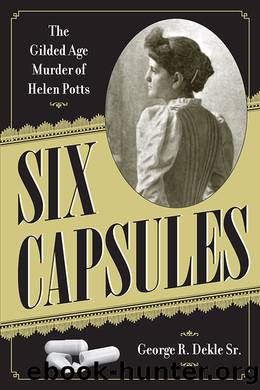Six Capsules by Dekle Sr. George R.;

Author:Dekle Sr., George R.;
Language: eng
Format: epub
Publisher: The Kent State University Press
Dr. Theodore Wormley, defense toxicologist (Wellman and Simms, The Trial of Carlyle W. Harris)
One of the first things that a lawyer should do when calling an expert witness is to demonstrate for the jury that the witness is truly an expert. Although this portion of an expertâs testimony can be overdone, it is essential to bring out every material fact that bears upon the expertâs knowledge, especially when the expert is challenging an opinion by another expert. Jerome sought to establish Wormleyâs credentials with a single question: âWill you just state to the jury your experience in chemistry, what you have written, what positions you have held, and what you hold now?â In answer to such a question a typical expert might expound for several minutes on his or her background, training, and experience. Wormley, however, was a modest man. He answered with a single sentence: âAt the present time I hold the position of Professor of Chemistry and Toxicology in the Medical Department of the University of Pennsylvania, in Philadelphia.â26
Jerome followed up by getting Wormley to admit that he had written a book on poisons, but he neglected to have Wormley testify that the book was in its second edition. Jerome should also have gone on to have Wormley tell of his professorships at Capital University and Starling Medical College; his position as chemist to the Ohio State Geological Survey; his editorship of the Ohio Medical and Surgical Journal; his vice presidency of the 1874 Centennial of Chemistry; his lecture on toxicology delivered to the 1876 International Medical Congress held in Philadelphia; and his medical service during the Civil War. These omissions almost certainly caused the jury to give Wormleyâs testimony far less weight than it deserved.27
Dr. Wormley testified in sum that of all the tests Dr. Witthaus conducted to detect the presence of quinine, no single one of them conclusively ruled out the presence of quinine in Helenâs body. Jerome neglected, however, to inform Dr. Wormley of one test performed by Witthaus. Wellman was happy to enlighten Wormley of Witthausâs results on that test when he cross-examined the doctor. In fact, that was the first thing Wellman did on cross-examination.
Wellman asked, âIf you were informed that Professor Witthaus, in connection with the bromine test, used alongside of him as a blank test one-eight-thousandth of quinine, and that it showed an emerald green under the amount of bromine that he used in this test, would that modify your opinion?â It certainly would. Wellman then asked Wormley what tests he would use to determine if quinine were in Helenâs body. Wormley testified he would use the exact same tests that Dr. Witthaus had used. And if he got the same results Witthaus got, would Wormley be willing to testify that there was no quinine in Helenâs body? He certainly would.28
The sum total of Wormleyâs testimony, then, was that although the tests Witthaus used couldnât conclusively rule out the presence of quinine, they were the tests that Wormley would have used;
Download
This site does not store any files on its server. We only index and link to content provided by other sites. Please contact the content providers to delete copyright contents if any and email us, we'll remove relevant links or contents immediately.
The New Jim Crow: Mass Incarceration in the Age of Colorblindness by Alexander Michelle(789)
HELTER SKELTER by Vincent Bugliosi(749)
The Complete Idiot's Guide to Forensics by Alan Axelrod(742)
A New Kind of Monster: The Secret Life and Shocking True Crimes of an Officer . . . And a Murderer by Timothy Appleby(728)
Love Behind Bars by Jodie Sinclair(712)
A Life and Death Decision by Scott E. Sundby(621)
A Wilderness of Error: The Trials of Jeffrey MacDonald by Errol Morris(597)
Ratman: The Trial and Conviction of Whitey Bulger by Howie Carr(593)
Executing Freedom by Daniel Lachance(591)
The Killer of Little Shepherds: A True Crime Story and the Birth of Forensic Science by Douglas Starr(588)
Stop and Frisk by Michael D. White & Henry F. Fradella(587)
Scotland Yard Casebook by Lock Joan(573)
Homicide Special: A Year With the LAPD's Elite Detective Unit by Miles Corwin(560)
The Central Park Five by Sarah Burns(559)
Issues and Controversies in Policing Today by Johnny Nhan(516)
Kidnapped by a Client by Sharon R. Muse(511)
Until Proven Innocent by Stuart Taylor Jr(500)
Why Some Women Lie About Rape by Linda Fairstein(467)
Rap on Trial by Erik Nielson(454)
